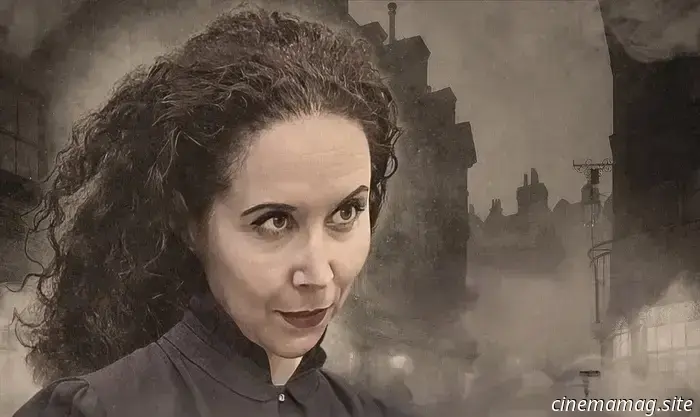
NYFF Review: The Currents is a Personal Reflection on a Fragmented Identity
The Currents opens with an impulsive act driven by curiosity. Lina (Isabel Aimé González Sola) is being honored for her achievements in Switzerland when she suddenly disconnects from her surroundings. Unable to process the cheers and admiration, she exits the event, walks to a bridge, and lets herself fall into the water below. The act appears involuntary, devoid of thought—almost as if she were pushed, yet there is no one else present. After surfacing from the water, she returns to Argentina a changed individual. Lina can no longer bear the sound or sensation of water; even the sight of it is difficult for her. During bath time, she cannot be in the bathroom with her daughter, Sofia (Emma Fayo Duarte), too filled with anxiety to face a full tub.
“I took a bath alone because you didn’t come,” Sofia tells her mother. When her father, Pedro (Esteban Bigliardi), comes home, he empties the tub and immediately senses something is wrong, but struggles to bring it up. As Lina's phobia begins to infiltrate every part of her life, she finds it impossible to endure a shower or wash her hair in the mornings. The sound, appearance, and feel of water terrify her. Seeking help from someone from her past, she grows more distant from her identity as a wife and mother. This fracture gives rise to a younger version of herself—the girl she was before marriage. We discover that prior to Pedro, she was not Lina; she was Cata, a young woman from a modest, dysfunctional background. Her husband's love, financial support, and overall influence transformed her into a fashionable and assertive woman of means. However, now, when she is with her daughter, Lina finds herself contemplating jumping off the balcony of their luxurious apartment.
Writer-director Milagros Mumenthaler crafts an intimate portrayal of a woman grappling with her fractured identity in her struggle against madness. Mumenthaler grasps the idea that motherhood involves a level of performance that reminds the mother that her life is no longer solely her own. Although her love for her daughter persists, she shrinks away from it, consumed with analyzing her life's current state. In therapy, Lina shares her fear of the water’s might and the strength of a current that could carry her away. It seems she has become acutely aware of the fragility of her existence, realizing that the confidence she once had has been washed away since her leap from the bridge. Despite the uniqueness of her fears, the underlying emotions are painfully relatable for any woman who feels overwhelmed by the inertia of her life.
Cinematographer Gabriel Sandru gives The Currents the appearance of a dynamic painting, emphasizing the textures of fabric, skin, hair, and water. The film’s score carries a grandeur that amplifies the psychological melodrama of what unfolds. Sola shines as Lina, a woman striving to contain her turmoil while revealing her inner struggle through her expressive eyes. Though more subtle in its intentions, The Currents evokes films like Tully and this year's If I Had Legs I’d Kick You: works that explore motherhood without sentimentality, probing the essence of becoming a parent and losing oneself along the way.
Can a mother feel complete when a part of her resides under her care? And what about the woman she was prior to becoming a "wife" and "mother"? Is it unfair for a mother to maintain an air of mystery around her child? These are the thematic questions that The Currents raises, without delivering clear answers. It’s through this ambiguity that we arrive at our personal truths. Mumenthaler seeks not to offer solutions; rather, she encourages us to navigate the waters ourselves and discover our own path to the shore.
The Currents was featured at the 63rd New York Film Festival.
Other articles
 Black Phone 2 rings up $ million globally during its opening for Blumhouse.
It's been a challenging year for Blumhouse at the box office, but the Grabber has turned things around with an unexpected opening of .5M for Scott Derrickson's Black Phone 2. We referred to Black Pho…
Black Phone 2 rings up $ million globally during its opening for Blumhouse.
It's been a challenging year for Blumhouse at the box office, but the Grabber has turned things around with an unexpected opening of .5M for Scott Derrickson's Black Phone 2. We referred to Black Pho…
 Sherlock Holmes Untold: The Adventure of the Music Hall Hearties is released by Big Finish.
Big Finish has launched Sherlock Holmes Untold: The Adventure of the Music Hall Hearties, a new full-cast audio drama featuring Nicholas Briggs and Richard Earl as the quintessential crime-fighting pair.
Sherlock Holmes Untold: The Adventure of the Music Hall Hearties is released by Big Finish.
Big Finish has launched Sherlock Holmes Untold: The Adventure of the Music Hall Hearties, a new full-cast audio drama featuring Nicholas Briggs and Richard Earl as the quintessential crime-fighting pair.
 McFarlane Toys has unveiled the Cheetah and current DC Page Punchers.
McFarlane Toys has announced two new additions to its DC Direct Page Punchers line: Cheetah (Crisis on Infinite Earths) and Extant (Zero Hour). They can be pre-ordered now, with a price of …
McFarlane Toys has unveiled the Cheetah and current DC Page Punchers.
McFarlane Toys has announced two new additions to its DC Direct Page Punchers line: Cheetah (Crisis on Infinite Earths) and Extant (Zero Hour). They can be pre-ordered now, with a price of …
 A new poster has been released for the Anaconda reboot featuring Paul Rudd and Jack Black.
Sony has released a new poster for Anaconda, the forthcoming comedic meta-reboot of the action-adventure horror series. This new installment is directed by Tom Gormican (The Unbearable Weight of Massive Talent…
A new poster has been released for the Anaconda reboot featuring Paul Rudd and Jack Black.
Sony has released a new poster for Anaconda, the forthcoming comedic meta-reboot of the action-adventure horror series. This new installment is directed by Tom Gormican (The Unbearable Weight of Massive Talent…
 NYC Weekend Highlights: The Unknown, João César Monteiro, Robert Downey Sr. & More
NYC Weekend Watch is our weekly summary of repertory events. Brooklyn Center for Theatre Research will have one last showing on Saturday of my Dylan-scored version of Tod Browning's The Unknown. Museum of Modern Art is starting a full retrospective of João César Monteiro (check out our exclusive trailer premiere). Japan Society presents what might be the finest series of the year, featuring Japanese educator and critic Shiguéhiko.
NYC Weekend Highlights: The Unknown, João César Monteiro, Robert Downey Sr. & More
NYC Weekend Watch is our weekly summary of repertory events. Brooklyn Center for Theatre Research will have one last showing on Saturday of my Dylan-scored version of Tod Browning's The Unknown. Museum of Modern Art is starting a full retrospective of João César Monteiro (check out our exclusive trailer premiere). Japan Society presents what might be the finest series of the year, featuring Japanese educator and critic Shiguéhiko.
 10 Comedy Films from 1995 That You Must See
There’s no shortage of laughter with these ten must-see comedy films from 1995… When life hands you lemons and you’re unsure how to turn them into lemonade, sometimes you just need to find another way to lift your spirits…
10 Comedy Films from 1995 That You Must See
There’s no shortage of laughter with these ten must-see comedy films from 1995… When life hands you lemons and you’re unsure how to turn them into lemonade, sometimes you just need to find another way to lift your spirits…
NYFF Review: The Currents is a Personal Reflection on a Fragmented Identity
The Currents starts with a spontaneous and intriguing action. Lina (Isabel Aimé González Sola) is honored for her achievements in Switzerland when, unexpectedly, she disconnects from her surroundings. She becomes unable to take in the applause or praise. Lina exits the gathering and meanders to a bridge, letting herself plunge into the water beneath. The action appears
